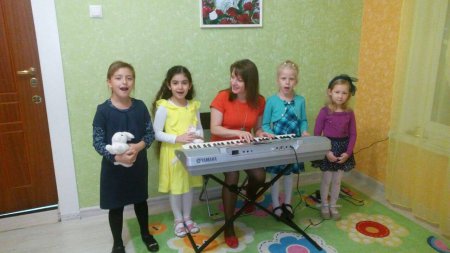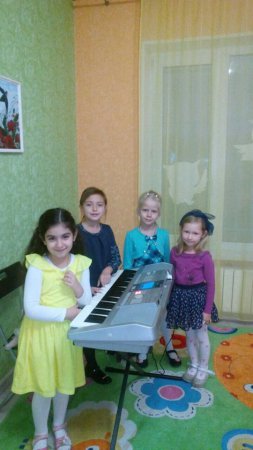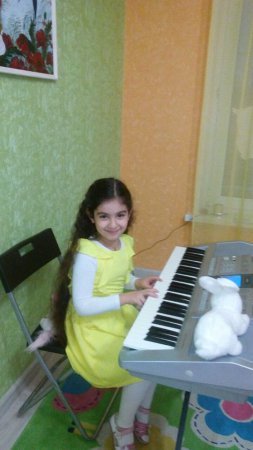Singing for children 3 years. Vocal and dance classes for the little ones. A lesson always consists of two stages
In the younger group of the Children's Music Hall, they are engaged in vocals and dances. the smallest artists- kids aged 3 years. Classes last 45 minutes and take place in a fun way. At this age, children perfectly feel the rhythm and pace of the melody, they easily improvise. The spontaneity of children's emotions, combined with the competent use of a large amount of props, helps kids to instantly enter the image, working out vocal and dance skills. Through imitation of the movements and habits of animals, children learn new movements, which a little later we will need when setting up the dance.
Three-year-olds know their favorite songs very well and want to hear them again and again. And nonsense or entertaining songs like "On the wall, in search of" bring pleasure for both them and adults and do not suppress the available range of the child. Songs that your child knows that can sing him partially or maybe even completely tell you what progress he makes in singing and in what repertoire he builds. Perhaps you will remember your favorite children's songs again.
Maria Zeeliger: A music ship. The holistic basic level creates the conditions for continuing education. Additional subjects, events and projects are important educational and substantive elements of the concept of a music school, which is also a member of the Association of German Music Schools. There are no age restrictions for students.
How are classes in teaching vocal and dancing babies in 3 years? Each of our classes necessarily begins with a greeting in the form of a fun imitation game in gestures. Kids of this age love to repeat one after another. movements of cats and dogs, Depict the flight of a butterfly and dragonfly. I like the children themselves to demonstrate their skills to others.
Baby rhythm Music and painting Early music education Basic music education. Instrumental carousel as a transition to instrumental lessons for children aged 6 to 9 years: In groups of four, five weeks, each is taught on one instrument, namely a voice recorder, cello, guitar, piano and trumpet. The instrumental carousel serves as a guide for a further musical career.
Instrumental and vocal lessons as individual or group lessons. The following instruments can be extracted from the Salzgitter School of Music: violin, viola, cello, double bass, flute, shalyumo, clarinet, flute, saxophone, trumpet, trombone, piano, jazz piano, keyboards, accordion, guitar, electric guitar, bass, Drums, vocals and percussion.
When learning dance at 3 years old, it’s too early to talk about the requirements for adult artists. No terms are used here. The most important thing at this stage is to teach the child to repeat the movements for the teacher. When teaching dance for such crumbs, the principle applies: "About what I sing, then I dance." The dance and music repertoire is selected by the teacher in such a way that the children's song necessarily has a plot that can be easily beaten, teaching kids vocals and dances. So, for example, when learning a dance to the song “Chick-and-Chick, My Chicks”, our kids with great pleasure hide a yellow ball (that is, a grain) under their little pillow and during the stage-dance “dig up” this kernel, “clean” their feathers, "spread their wings", "walk in the meadow", etc. It is amazing how accurately and quickly the kids remember the order of actions and movements!
Combined partner lessons: individual and group lessons in combination. Music therapy for the following target groups. Children with social and emotional problems Children with moderate psychosomatic diseases Children with developmental delays Children with autism. Music therapy is also preventive, i.e. used before diseases.
Rehearsal of a children's musical with children aged 8 to 14 years during the last week of summer vacation. Every year, music listeners actively participate in 50 events. . Seminar for children in the framework of the Salam festival. Dancer Bahara Caseruni leads children on bumpy, dusty paths. You find yourself in a refreshing oasis where you can expect some surprise.
Vocal part classes intertwined with the outline of the lesson again through the game. During vocal lessons, kids love to play along with themselves on musical noise instruments, slam or tack at a certain moment. And really, really like our little artists sing one at a time, individually! In such vocal lessons, kids learn to listen to music, hear themselves and the whole group, sing loudly and quietly, sing in chorus and solo.
Bookable offer for kindergartens, schools, birthday parties and various events: “Trip to the East”. Funny stories, music and dances from the East and Africa. Bahara tells a story that will lead you to the East. Strange odors fill the room, and the journey can begin!
Thanks to Bahara’s proposal, a piece of the rhythmic and musical world is explored in a warm and energetic way. Children feel the body, feel the music, experience different feelings, are accompanied by their imaginary thinking and plunge into the world of the East Games and poems.
If you are planning to give your baby to vocals and dances in our Children's Music Hall, then keep in mind that this will be a cross between children's fitness and children's yoga, a vocal lesson and choreography, rhythm and a developmental activity to get acquainted with the environment. Well, of course, we are waiting for you at our open lessons, at demonstrations,held regularly every 2 months.
In the East and in Africa, everyone is dancing, singing and drumming: girls and boys, women and men of all ages and in all kinds of cases. Since time immemorial, the experience has been translated into song, dance and rhythm. This expression is very moving, fun and fun! Teens love to express themselves through the movement and experience of the drums as a powerful, social element. Movement and music come together and bring joy and fun to the group.
Each member of the group can try for himself what is interesting and discover his own preferences. This not only creates joy in joint actions, but also thanks to music and dancing, a wonderful social experience is growing that strengthens each person and the structure of the group.
Vocal lessons - A find for parents and children. With the teacher’s skillful approach and the age-appropriate form of training, almost all children like them very much. Vocal lessons teach a child to sing "live", thereby opening a new path to self-expression. Children of all ages feel and understand music very well, because they are talented by nature!
The seminar was developed in accordance with pedagogical principles and didactic concepts and is intended for children groups from 2 years old and youth groups. Depending on age, group size and case, the offer is offered separately. Fabrics and dance accessories are provided. Oriental and African drums can also be delivered upon request.
Barbara Caseruni is a trained kindergarten teacher, elementary school teacher and studies pedagogy at the University of Vienna. As a social educator, she worked with children and adolescents more than 10 years ago in outreach work and mobile work with youth, where she carried out her first projects on “Rhythm, Dance and the East.” Since then, she has repeatedly combined her two professional areas: pedagogy and dance.
Singing is an amazing lesson in which the child develops in three directions at once:
- intellectually (developing memory, attention, thinking)
- physically (vocal skills are developed - proper sound extraction, singing breathing, as well as the development of endurance, strength and range of voice)
- musically (develops ear for music and emotional responsiveness)
Regular vocal lessons contribute to the removal of physical and psychological clamps, the development of clear diction, artistry, and performances teach you to "feel free" in public. This will come in handy for your child in adulthood.
She offers her seminars in kindergartens, schools, youth centers and dance studios. “Rhythm and Oriental Dance” with Bagara for children and adolescents with a 2-year group ranging in size from 10 to 25 participants. Unique workshop: rhythmic training, dance, movement, play and fun. 1 hour with Bagara - Euro: 7, 50 per participant 1 hour with Bahara and drummer - 15 euros, - per participant.
3rd block: 3 times for 1 hour each with Bahara - Euro 22, - each part 3 x 1 hour each with Bagara and a drummer - 44 euros, - for a part. Events and animations at festivals and events. Participation in holiday camps and sports weeks. Training for teachers by appointment.

Useful time kids club vocals take place 2 times a week
Lesson lasts 45 minutes.
Age groups
- 4 to 6 years
- 6 - 9 years old
- 9-12 years old
- 12 - 18 years old
Classes are held in a mini-group of up to 4 people, which allows you to find an individual approach to each child. Individual lessons are also possible.
Courier article on seminars during the Salam festival. Thanks to singing, dancing and playing, children make their first sound and rhythm with elementary instruments. They test themselves and form themselves in a group. Course sentences of elementary music accompany children in their development from toddlers to schoolchildren.
Primary education takes place in many parts of Freiburg. Four different options. Together with a parent or other adult acquaintances, children participate in music lessons. Through songs, dances, games, etc. children develop a sense of humor for their voice and body with pleasure. Simple tools lead the child into the world of sounds. Foreground is the joy of playing music. The rituals at the beginning, in the middle and at the end of the structure of the musical lesson are fixed.
The main task of the classes is to help the child master the elementary methods of singing and instill a love of music and creativity.

A lesson always consists of two stages:
- Chanting: Songs - chants with the text warm up the ligaments and prepare directly for singing
Early music education from 4 years old
Children go on a journey to music together. They make and hear music and express it in motion and in photographs. The rhythm and music help the child to test himself in the group. Through stories and paintings, musical foundations survive, understand and shape playfully. Orff's and percussion instruments are as much a part of the class as singing, singing and dancing from around the world.
The piano garden is a lesson to start the piano. Children over the age of four play an instrumental game playfully and without any pressure to perform in a small group. According to the motto “from playing to playing the piano”, the instructions in the instrument are built into various musical forms of the game.
- Singing: Here, our lesson turns into a small action, we beat the song. After all, we are well aware that the best assimilation of material occurs through the game. Therefore, our classes combine vocals, dance movements and acting.
The atmosphere is always creative and playful.
So, what is the use of vocals ?!
- direct voice development through song material
- development of intonation, diction, articulation, proper breathing
- development of basic musical abilities - musical and vocal hearing
- development of a sense of rhythm and musical memory
- development of emotional expressiveness and receptivity of music
- development of the ability to empathize, as well as figurative and associative thinking, creative imagination.

In the first half of the year, children deepen and differentiate their musical foundations. The rhythm, singing, accompaniment of a song and the study of fixed dance forms are important components of the lesson. To do this, they will recognize five large families of instruments and try them.
Discover the world of music in a playful way with your child
The music workshop will continue in the second half of the year. The most important goal of early music education is to influence and support your child’s early childhood development. Thanks to the intense stimulation of the three senses, your child will play with noise, sounds and sounds playfully.
It is also believed that vocals in children have a therapeutic effect. Proper singing (diaphragmatic) breathing strengthens the walls of blood vessels. Children learning vocal skills are less likely to have colds. In addition, vocals help solve the problem with stuttering. But the most important thing is that in vocal lessons the child relaxes, reveals himself as a person, and learns to communicate with peers.
Why early music education is important
The playful handling of music, its sounds and sounds also contributes to the development of voice and the processing of various instruments. In addition, playing, dancing and singing together in a group also contributes to your child’s social behavior and teamwork. The background of early music education is primarily preparation for subsequent instrumental and vocal training. It should have a motivating effect, and let your child playfully open the world of sounds. With an extensive repertoire of instruments such as glockenspiels, rattles, drums and pianos, as well as simple rhythmic dances and singing, they accompany instrumental instruments.
In addition, a constant stay in a musical atmosphere not only educates and develops your child, but also corrects his psyche and emotional state. So the excess energy of mobile and hyperactive children goes into creation and creativity, and calm and shy children gain confidence in themselves and their abilities.
The joy of discovering and creating music creates a wide base of experience in music and facilitates learning a musical instrument. The lessons are very inspiring and, above all, help to focus on basic education, as well as instrumental and vocal lessons.
How long does the lesson take?
“Early music education is music without limits.” One lesson Early music education usually consists of 6 children. After 45 minutes, the children playfully met with music. The courses themselves are playful and experimental in nature. During the first two months, you can at any time cancel your contract in writing without giving reasons.
“Imagine a beautiful girl alone in the sacred house sings this song ... and her voice is so strong that people hear it both in the desert and on the ocean, and gradually her voice fills the whole Universe. With the sounds of her voice, flowers bloom, the impossible becomes possible, and the whole world is dancing with her. In her voice there is magic that no one can resist, and all dreams become reality. The whole world is dancing to her song, and when he is dancing, hearts are filled with joy, and the world begins to sparkle, like a rain-washed pearl. " Khamoshi: The Musical
Availability and lesson time
After the testing phase, you can cancel your contract in writing every 3 months. If you cancel within 7 days of the end of the trial, you will receive a 50% refund of the monthly tuition fee. You personally and flexibly organize your classes with a music teacher. Missed lessons do not expire, you can catch up with them at any time.
The beginning of singing and playing music takes place in Concy over the entire range of group courses. The offer includes courses for children from 1 to 8 years. In small and large groups, children learn the world of sound and feel the music while singing, playing and moving. They train their hearing, sense of rhythm and sound, and the ability to perceive space.
“The only thing better than singing is more singing.” (“The only thing that can be better than singing is more singing.”) Ella Fitzgerald
Save Save